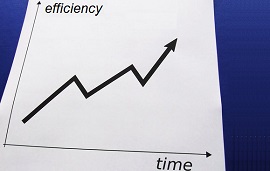If your furnace is older than you are or is behaving like it should be enjoying retirement, chances are it is time to upgrade your system. Instead of choosing the cheapest replacement, you may wish to consider a high-efficiency furnace. These models are available as natural gas, propane or electric units. They can offer excellent energy savings, but before you make a purchase decision, you need to know the basic facts about these types of unit so that you can make an informed decision.
What Makes a Unit High Efficiency?
High-efficiency furnaces have an AFUE (annual fuel utilization efficiency rating above 90. The AFUE rating is a numerical way to represent the percentage of fuel energy directly converted to heat. This is an excellent indicator of the overall efficiency of the unit. For example, if the unit has an AFUE rating of 90, this means that 90% of the fuel energy is used for heat and only 10% is wasted through loss. While an AFUE rating of 80 is common in the marketplace, high-efficiency units often have a rating in the high 90s.
High-Efficiency Furnace Prices:
The price of high-efficiency furnaces can vary considerably. The most important factor affecting the installation cost is whether the new unit can be used with your existing ductwork and system. If your system does not require updating, you could be looking to spend approximately $5,000 for a typical installation. While this is a significant investment in your home, it could be worth considering also upgrading other components of your HVAC system for maximum energy savings.
The Benefits of High-Efficiency Furnaces:
So, if you are going to be spending more money than a basic replacement, you may need a little convincing of the benefits. Fortunately, there are lots of benefits offered by this type of unit. For example, high-efficiency units are better equipped to maintain your ideal temperature inside your home, without using as much energy as a would be used with a traditional furnace.
The primary reason why you may want to consider a high-efficiency unit is that while there is a higher initial investment and upfront costs, you will enjoy greater savings throughout its lifespan. There are also often incentive schemes and grants available to offset the initial cost of installation. This means that you should see reduced energy bills immediately after installation, reducing your household expenses.
Finally, high-efficiency units are more environmentally friendly. This type of unit produces fewer carbon emissions and fewer pollutants, especially when compared to older furnaces. This means that you can not only save money and enjoy a more comfortable home, but you can also reduce the environmental impact of your home.
Is a High-Efficiency Furnace the Right Choice for Your Home?
In order to assess whether a high-efficiency furnace is the right option for your home, you will need to look at specific details such as the unit cost, optimum furnace size and ongoing costs. A professional HVAC specialist will be able to help you to determine what options are available within your budget and which unit is best suited to the particular requirements of your home.
